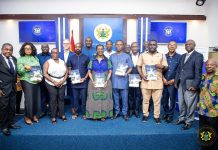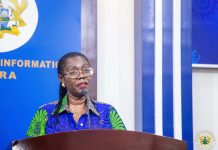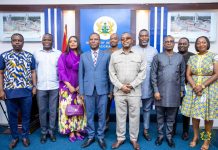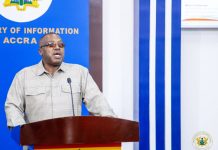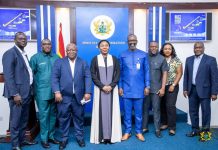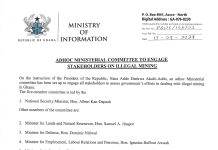Galamsey, which means “gather them and sell,” (a local Ghanaian term that means illegal small-scale gold mining in Ghana) has been an age-old method of creating a living for individuals in Ghana’s small towns since the 1970s. However, the technique has evolved into a large-scale timed bomb that is ready to detonate.
Illegal small-scale mining, sometimes known as ‘galamsey,’ typically entails physically digging small working pits, tunnels, and drains for gold. Galamsey practitioners, unlike commercial miners, can only dig to a limited, shallow, and lesser depth. Their operations are often unregulated, resulting in significant environmental ramifications and effects. Many people in rural villages still make a living through illegal mining.
According to miningreview.com, the practice employs an estimated 60 percent of the country’s overall mining labour force and provides a living for millions of people. Regardless, the practice continues to affect Ghanaians, communities, and state resources.
Our water bodies have been mostly depleted, and farmlands and forest reserves have been depleted, resulting in devastating consequences for the immediate environment, food production, water, education, and health, to name a few.
As a result, the practice was made illegal under the modified Minerals and Mining Act of 2015 (Act 900) and the Minerals Commission Act of 1993 (Act 450). It is a crime under the law to mine any mineral without a concession and an authorized license.
Anyone found guilty of this offense in Ghana risks a minimum of 15 years in prison and a maximum of 25 years. In addition to the increased minimum sentences, convictions may result in minimum fines of 150,000 penalty units.
Despite the cited rule, illegal small-scale mining is nevertheless prevalent in most parts of the country. Ironically, popular outrage and opinions about its bad effects on Ghana’s natural resources diminished over time, until the revival and stunningly revealing operations of galamsey kingpin ‘Aisha Huang’ rekindled interest and discourse in the country.
This position, combined with recent developments, has reignited outrage and unhappiness among Ghanaians on the subject, increasing pressure on the government and state actors to act.
The government reacted appropriately by launching Operation Halt and, more recently, Operation Halt II, both of which were coordinated by the Ministry of Lands and Natural Resources.
Operation Halt continues to be one of the most aggressive special joint military and forestry task teams designed to put an end to all unlawful mining operations in the country’s forest reserves.
Furthermore, some particularly vulnerable river bodies and forest reserves were designated as red zone locations, which meant that no mining activity may take place in or near such areas. Except in exceptional circumstances, the government also restricted activities in forest reserves such as reconnaissance, prospecting, and exploration.
In October 2022, Operation Halt II was relaunched to enhance the fight against illegal mining and prevent its reappearance in the country.
The Minerals Commission will now consult with our most esteemed traditional rulers when granting mining licenses under the new mining regime. This single decree from the government has been widely praised, especially given that traditional leaders have repeatedly stated that they have no active or direct role in the processes leading to the eradication of galamsey in Ghana.
It has become evident that traditional leaders and chiefs must play an important role in the government’s anti-galamsey drive, particularly in awarding mining concessions and licenses.
After all, each galamsey site is under the jurisdiction of a traditional authority, and their direct monitoring will aid in the eradication of unlawful small-scale mining in their individual domains.
Significantly, the disparity in the fight against unlawful small-scale mining between chiefs, political leaders, and security officers will no longer be an incentive for galamseyers. While this directive is regarded as the greatest opportunity, it also poses a significant challenge for the National House of Chiefs, the recognized body under the constitution, to connect with the directive and establish the necessary protocols to enable traditional leaders to live up to the expectations of the government and the entire Ghanaian people.
Ghana, like most African countries, is endowed with hospitable lands, minerals, cocoa, coffee, shea nuts, forestry, timber, water bodies, human resources, and so on.
Many people have identified ‘God as a Ghanaian’ as a result of this nice deed. Unfortunately, this advantage has not been enough to turn the country’s fortunes around. Rather, it has harmed our people. Clearly, having all of the natural resources is not enough; what is more important is how they are handled.
According to existing research, the driving elements of galamsey in most sections of the country include poverty, a lack of employment possibilities, and the desire of the youth to get rich quickly and at any cost.
It is now up to our most recognized leaders to upend the status quo. But the basic question is whether our traditional leaders are capable of meeting these expectations.
FIGHTING MIS/DISINFORMATION TOGETHER!
Campaign against mis/disinformation #VerifyFirst
Misinformation has always been a plight for individuals, companies, entities, institutions, and countries. Various measures have been put in place by individuals and institutions to combat misinformation. However, the heightened threats and the rate at which misinformation spreads have become a cause for alarm. This has necessitated the need to constantly combat mis/disinformation and also educate the general public, especially netizens on how to identify, verify, impact, and effect of mis/disinformation.
Ultimately, combating disinformation is a shared responsibility that requires the cooperation of individuals working together as a task force to promote truth and accuracy. In its quest to protect the integrity of information shared in digital media and safeguard the well-being of communities.
Recently, the Ministry of Information launched a campaign to combat misinformation. The campaign was rolled out to fight mis/disinformation on social media platforms where the spread of misinformation is massive and easy. The campaign was also geared towards educating netizens on the effects and impact of mis/disinformation.
The campaign was on various digital media platforms of the Ministry: Facebook, Twitter, and Instagram. The campaign was also supported by renowned influencers like Manasseh Azure, Naa Ashorkor, Nakeeyat, and Ameyaw Debrah and sponsored by United Nations International Children’s Emergency Fund and the National Petroleum Authority. The Ministry also invited all Ghanaians to partner with them on this remarkable journey towards reducing the spread of false information in Ghana.
The success and result of the fight against false news depend on us, whether big or small, literate or illiterate. This is an all-inclusive fight that needs everyone on board. Let’s come together to fight mis/disinformation!
SOURCE: MOI (PR Unit)

